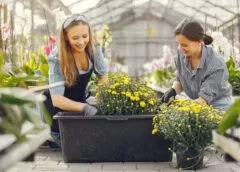Poor organic gardening can negatively affect you, both physically and emotionally. It would be best to do a lot of your research to avoid wasting money, time, and resources on improperly growing your garden. Some tips are listed below to help you start properly growing the ideal organic garden.
When taking an organic path to control garden pests, try to build up the soil to allow healthy microbes to flourish. Earthworms are also essential to organic gardening, and they should be encouraged to stay in the soil. When the soil is unhealthy, it is not as resistant to pests.
Making your compost for organic gardening is extremely simple and easy to do. It provides the soil of gardens with rich nutrients and keeps soil cool during the summer months. You can use kitchen waste, sawdust, aquarium water, coffee grounds, tea leaves, rabbit or hamster droppings, a thin layer of lawn clippings, spices, and eggshells in your compost.
Coffee grounds and leftover coffee can be used to repel slugs. If you have an issue with slugs in your garden, you can repel them effectively with coffee. You can sprinkle coffee grounds on the soil around your plants or use leftover coffee in a spray bottle to spray the slugs directly.
Manage your garden hose to prevent frustration. Garden hoses, significantly longer or heavy-duty ones can become unwieldy and annoying when you have to drag them around the garden all twisted up. Invest in a portable hose reel or a stationary one, depending on your garden configuration, to manage your garden hose more efficiently and make storing it fast and easy.
Use mulch in your organic garden. Mulching helps retain moisture and helps provide nutrients to your growing plants. It would be best to use at least a three-inch layer of mulch in all of your beds. It will also make your garden beds look as if they were professionally finished.
If you don’t have a big yard or yard, you can still grow great organic produce in containers. Other than some root vegetables, most vegetables grow just as well in pots as in the ground. Many varieties have been bred to do well in containers.
When running your organic garden, a great tip is to immediately fertilize your seedlings when they receive their first true leaves, which will appear as soon as the cotyledon disappears. If your seedlings are not immediately fertilized, they will die unless you use a mix with no soil that does not have compost.
The best and most natural way to fertilize an organic garden is with compost. Compost can be made from anything that was once alive. Don’t discount the value of your kitchen waste, leaves, grass clippings, or anything else that was once alive. By composting it all, you will give invaluable life to your organic garden.
The best time to water your organic garden is early in the morning. By watering at the start of the day, you allow any moisture accumulated on the leaves to dissipate. This helps to discourage the growth of any mildew or fungus on the leaves that cold air and water would combine to create.
When growing seedlings in your organic garden, lightly brush over them using your hand up to twice a day. Although this method may seem counterproductive, it helps the seeds grow quicker and more robust.
If you need to protect your plants in your organic garden from frost either early in the season or at the end of the season, here’s a great frugal way to cover them. Milk jugs, soda bottles, and other plastic containers you can find around the house are perfect for protecting your precious plants from harsh frost.
Temperature control is significant for indoor organic gardening during the early phases. Seventy degrees Fahrenheit is the ideal temperature for most seeds to start growing. You can quickly achieve this temperature by installing heaters and placing the seeds near the vents. You can also purchase heat mats to place under your plant containers.
To get rid of certain caterpillars or worms, you have to use special netting to hide them from your leafy green plants, such as broccoli. This net will keep the pests out and away from damaging your crops while maintaining the organic essence of your garden.
Your soil will be healthier if you add mulch. Mulch can give your soil some additional protection and nourishment. It protects the plant roots, keeping the ground cool on a hot summer day. The layer of mulch will also minimize evaporation, reducing your need to water as frequently as you would a garden without mulch. It can also help alleviate any weed issues.
Grow basil successfully. Basil is an annual warm-season herb, very susceptible to cold and frost. Sow seed in spring at a depth of about 1/2 inch in full sun. Keep the soil evenly moist. Pinch out the top when the basil reaches about 6 inches to encourage bushy growth. Pick continuously before any flower buds open. Pick leaves in the morning after dew has dried, and don’t over wash leaves, as you will lose the aromatic oils.
Get rid of aphids naturally. In the garden, most aphids are taken care of by beneficial insects, but you sometimes find an infestation. Aphids can cause plants to be stunted or distorted and can create a sticky mold that will quickly spread from one plant to another. Use a homemade spray to blast aphids off the plant. A forceful jet of water 2-3 times a day will quickly get rid of them. For a more substantial infestation, use insecticidal soap.
Poor organic gardening can be very troublesome, but you can grow a better garden with some work and some patience. It takes research, hard work, and patience to start seeing the “fruits” of your labor. Do yourself a favor and try using the above tips to help grow a beautiful organic garden.

